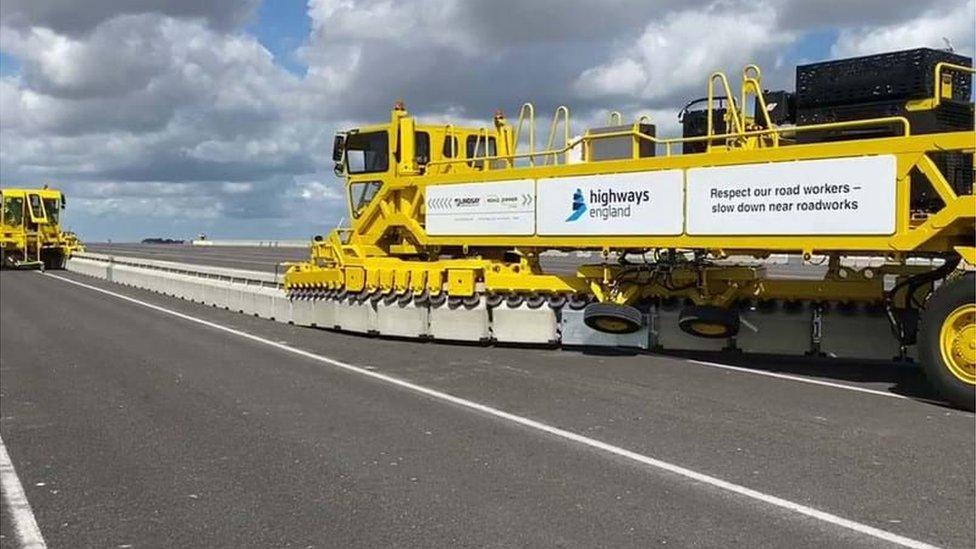Dover cross-Channel ferry disruption begins to ease
- Published
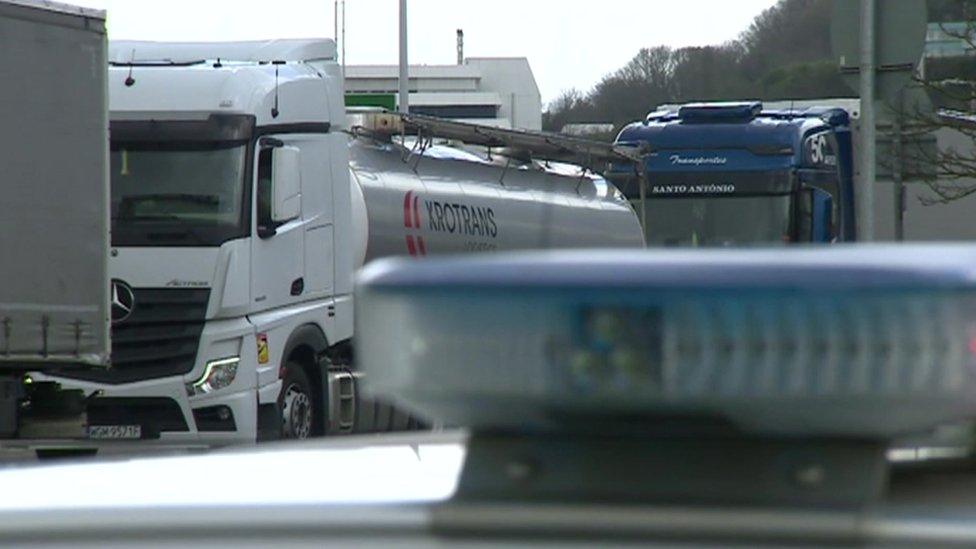
Part of the M20 has been turned into a lorry park for freight vehicles attempting to reach Calais
The Port of Dover says many roads approaching the ferry terminal are now "free-flowing" after disruption on Saturday led to waits of up to nine hours for drivers.
Capacity at the port had been reduced due to the suspension of P&O services.
Despite two DFDS vessels also being taken out of action, services had been coping well until a surge in demand, due to Easter travellers.
The port added there was "space in the port for those arriving today".
Freight traffic is still being advised to use the M20 as the "quickest route".
Speaking to BBC Breakfast on Sunday, Richard Ballantyne, chief executive of the British Ports Association, said: "It is a bit better today, we understand. Yesterday we were up to nine-hour queues outside the port,"
"Traffic measures are in place, which... are working fairly well and it enables other people around east Kent and businesses, residents... to move around freely. But [it is] not a good position if you're stuck in a vehicle for six to eight hours."
Operation Brock has seen part of the M20 turned into a lorry park, for freight, while other traffic is using the opposite carriageway as a contraflow.
Using a concrete barrier between Ashford and Maidstone, the measure was originally introduced to keep traffic moving amid fears a no-deal Brexit would lead to delays at the border.
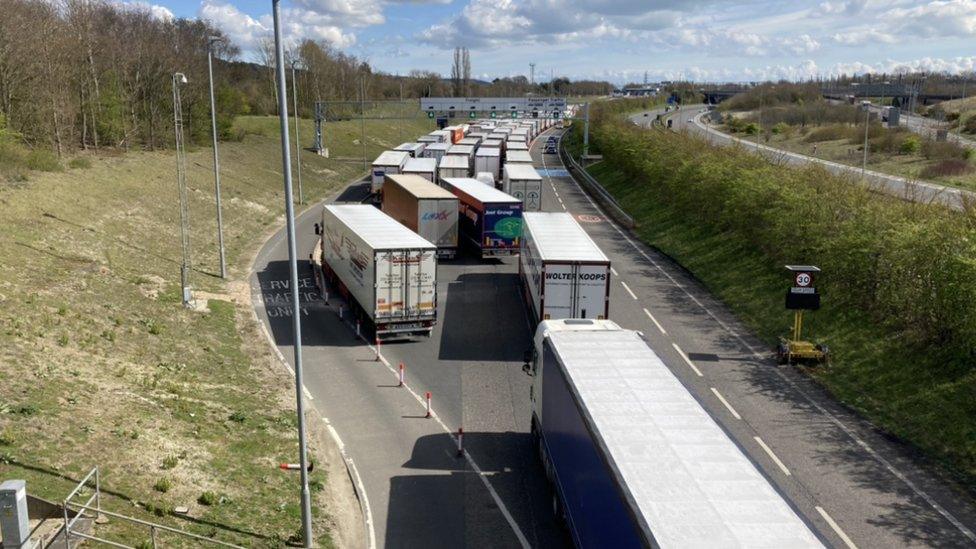
Eurotunnel says it has carried "more traffic than it ever expected" this weekend, as demand returns to pre-pandemic levels
As well as a surge in demand for ferries ahead of Easter, Eurotunnel said it had similarly seen the "busiest sustained period of traffic" since before the pandemic.
"For us this is business as usual back to where we were three years ago," John Keefe, from Eurotunnel, said.
He added the situation had been made "a little bit more tricky" with the situation facing P&O, which was putting more pressure on other operators.
Traffic 'bedlam'
Logistics UK, which represents the haulage industry, said its members had been diverting routes, where possible, to travel via Eurotunnel after Saturday's delays heading to the port.
Despite traffic flow improving since Saturday, a coach driver trying to get to Austria described the scene in Dover first thing on Sunday as "bedlam", with too many cars and lorries trying to get on too few ferries.
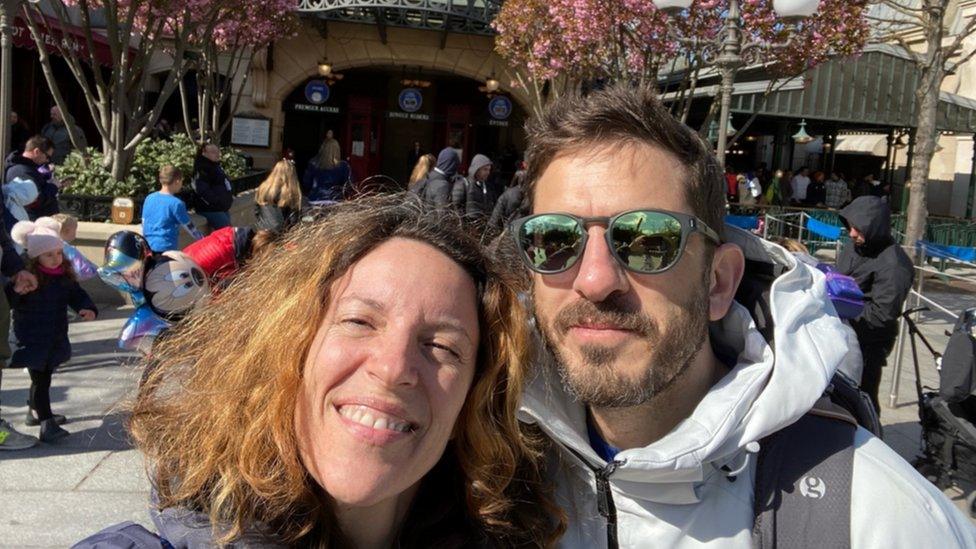
Elena Noseda and her husband Alessandro Pula made it to Disneyland for a family holiday after queuing for hours on Saturday
Elena Noseda, meanwhile, was left stuck in queues with her husband and two young children as they attempted to reach Calais on Saturday.
"The struggle was nobody was giving us any information. Nothing from local authorities or DFDS," she said.
"[In] the first few hours there was no access to facilities. We were lucky, we had our campervan and games for the children but other families in cars with little children had to try and entertain them for a long time."
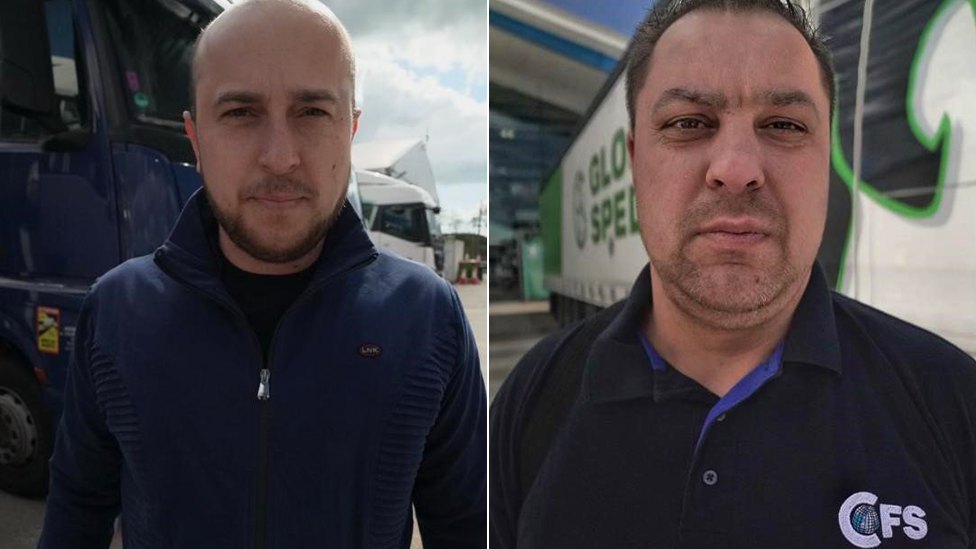
Truckers Afrim Alele (L) and Christian Hermanowski (R) said demand for spaces meant truck stops near Ashford were full by midday
'No one cares'
While the flow of traffic has improved for non-commercial vehicles, hauliers are still experiences delays as a result of the backlog of trucks involved in Operation Brock.
At Stop 24 truck stop in Folkestone, driver Taodol Sivakov from Bulgaria told BBC South East: "No one cares about us. We just don't know how this is going to end and when."
Meanwhile, fellow drivers Afrim Alele, from Macedonia, and Christian Hermanowski said demand for spaces at truck stops meant most spaces were booked out by midday and some HGV drivers had been waiting for two days to attempt a crossing.
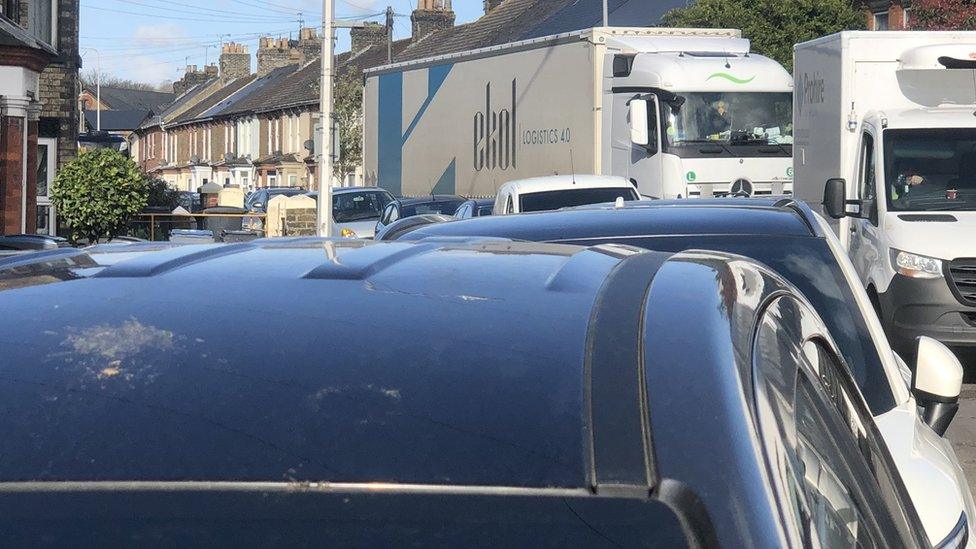
Traffic jams spread beyond the M20 to surrounding roads
DFDS said it had continued sailings throughout the night, rather than stopping for maintenance work, in a bid to clear the backlog.
It added that two of its ferries, which have been out of action, were expected to be back in service by Tuesday.
Traffic problems spread beyond the M20 to surrounding roads and the centre of Dover. While still busy, a spokesperson for the Port of Dover said that was easing.
Local MP Natalie Elphicke blamed P&O for the problems - the firm has yet to be given permission to resume sailings to France since sacking 800 staff last month.

Follow BBC South East on Facebook, external, on Twitter, external, and on Instagram, external. Send your story ideas to southeasttoday@bbc.co.uk.


Are you stuck in a traffic queue in Dover? Tell us your story by emailing: haveyoursay@bbc.co.uk, external.
Please include a contact number if you are willing to speak to a BBC journalist. You can also get in touch in the following ways:
WhatsApp: +44 7756 165803, external
Tweet: @BBC_HaveYourSay, external
Or fill out the form below
Please read our terms & conditions and privacy policy
If you are reading this page and can't see the form you will need to visit the mobile version of the BBC website to submit your question or comment or you can email us at HaveYourSay@bbc.co.uk, external. Please include your name, age and location with any submission.
Related topics
- Published3 April 2022
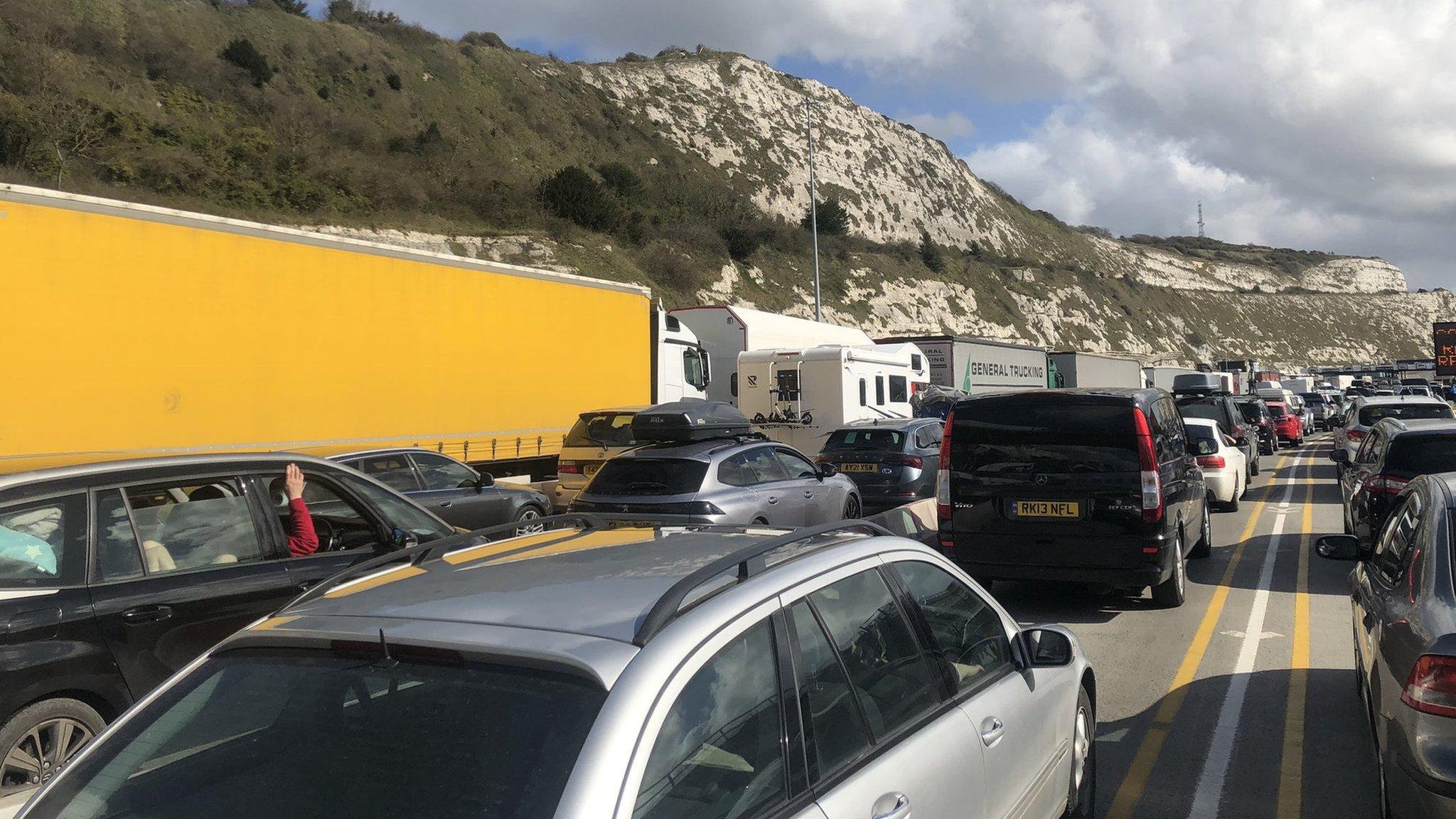
- Published1 April 2022
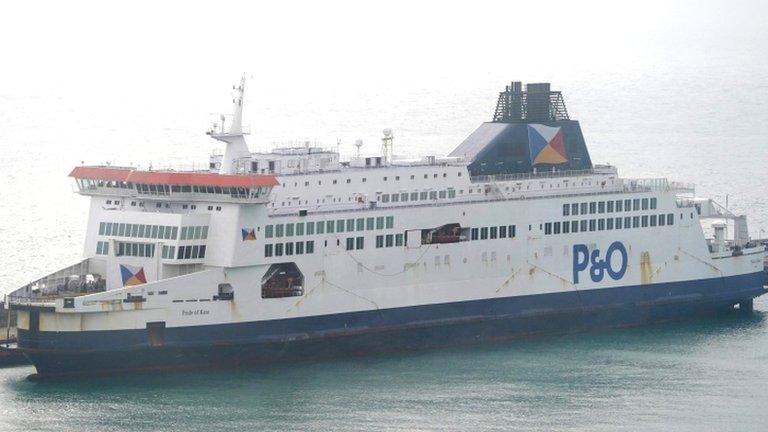
- Published31 March 2022
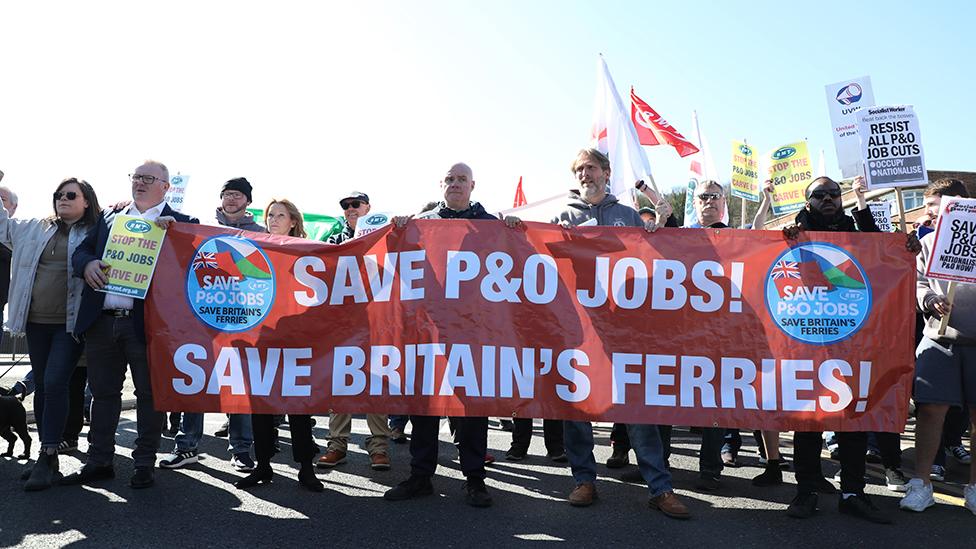
- Published28 January 2022
